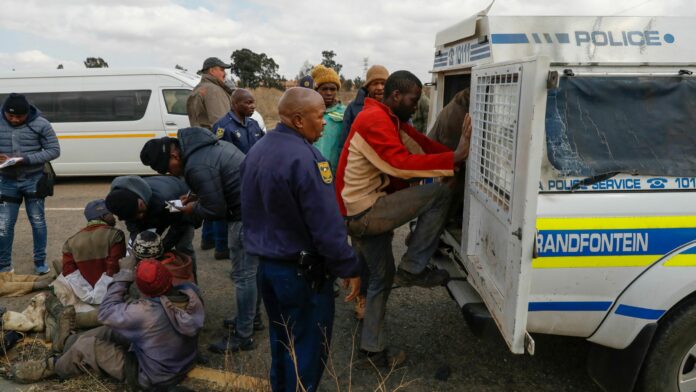
ILLEGAL mining in South Africa is “as bad as it’s ever been”, according to Minerals Council CEO, Roger Baxter who has called on the country’s government to make sure its proposed ‘specialised police unit’ is implemented properly.
To do this, Government needs to draw from private sector skills, a practice it hasn’t shown proficiency in achieving, as well as integrating knowledge held in other departments.
“The mining sector can solve the issues on the mining side; we’ve got the capability, but criminal activity is in many other areas: money laundering, gun running, prostitution. All these things are interlinked in the way that organised crime works,” says Baxter who was commenting in an article published in the Financial Mail, a magazine.
“On the crime side, this is as bad as it’s ever been in the mining industry,” said Baxter who likens illegal mining to be growing crisis on the country’s rail and port infrastructure where copper cable theft, sabotage and corruption are harming minerals exports.
Mines and energy minister, Gwede Mantashe announced the formation of the police unit in September saying at the time illegal mining was “an existential threat” to the sector. The Minerals Council estimates R49bn was lost to illegal mining in 2019.
Former police commissioner, the late Jackie Selebi, disbanded the South African Police Service’s gold and diamonds investigations before his fall from grace in 2010. Therefore a challenge for SAPS today is to re-build the skills and knowledge to chase down syndicates involved in minerals theft.
A crime scene investigator (CSI) in SAPS with long-standing experience in illegal mining told the FM that replacing lost skills in intelligence, policing and investigations was a huge task. “The partnerships are gone now. When they closed the unit down, the people left the police or they’ve aged out of it. So that knowledge is gone. You can never replace that, and that is what the police don’t understand,” the CSI said.
There also needs to be fresh approaches to weaknesses in mining-related regulations that erroneously hand mining licences to criminal operators, especially in the chrome sector where mining of abandoned stockpiles contributes towards illegal exports equalling 5% of South Africa’s total chrome production annually.
Two- to three-year wait times for environmental permits from the department of minerals and energy (DMRE) is one reason so many surface deposits lie idle.
Johannesburg-listed exploration and development firm, Orion Minerals has rock dumps from which it could produce copper within two weeks, claims its CEO, Errol Smart. Instead, illegal miners turn up on site to mine these resources with their own permits granted either erroneously, owing to dysfunction in the licensing regime, or obtained by corrupt means.
There’s also an estimated 6,100 ownerless or derelict mines waiting for closure certificates from the DMRE that currently provide easy pickings for syndicates.
Illegal mining is also perpetrated by sophisticated and well financed crime syndicates who are able to breach even the tightest security to operating mines.
According to Nash Lutchmann, a former brigadier of the SAPS when Selebi was in charge, syndicates often traffic labour to work illegally in mines such as the deep-level gold operations of Sibanye-Stillwater where he is head of security services.
Lutchman tells the FM it can cost a syndicate between R20,000 to R40,000 to install an illegal miner into an operating mine, a sum of money the ‘foot soldier’ has to work off before he earns money for himself. These ‘miners’ are often trafficked, often intimidated, and often require no encouragement at all since there’s no viable work to be had in the community. “He starts off on the backfoot with debt. He’s a slave,” says Lutchman.
This is a dangerous work. Whereas mine employees are kept from blast areas three hours after detonation, an illegal miner will immediately take himself to the stoping area to “scoop up” as much blasted ore as possible before retreating to a secluded, closed area of the mine.
Before that happens, Sibanye-Stillwater security is normally paid off in order to deploy illegal miners underground. A dual income family where one of the breadwinners works in mine security, might earn R12,000 a month, says Lutchman. “People succumb to that pressure. Sometimes, people who don’t accept bribes put their lives in danger.”
Illegal mining along with community unrest is a major source of concern to international investors who cry off dedicating funds to South Africa’s mining sector. They also worry over uncertain mining policy and poor administration of the regulations.
Fiona Perrott-Humphrey, a senior advisor to Rothschild & Co’s UK mining team says difficult mine community relationships and complex empowerment regulations and high capital intensity of new deep mines “have just got too hard” for offshore investors.
While illegal mining it’s hardly unique to South Africa, Government here “hasn’t vaguely understood the extent to which it needs to intervene in the crisis,” Perrott-Humphrey says.
Critical for Government is to make sure the specialised police unit becomes more than a good idea. Says Baxter – who is paid to be optimistic – “engagement is one thing; outcomes are another”.










